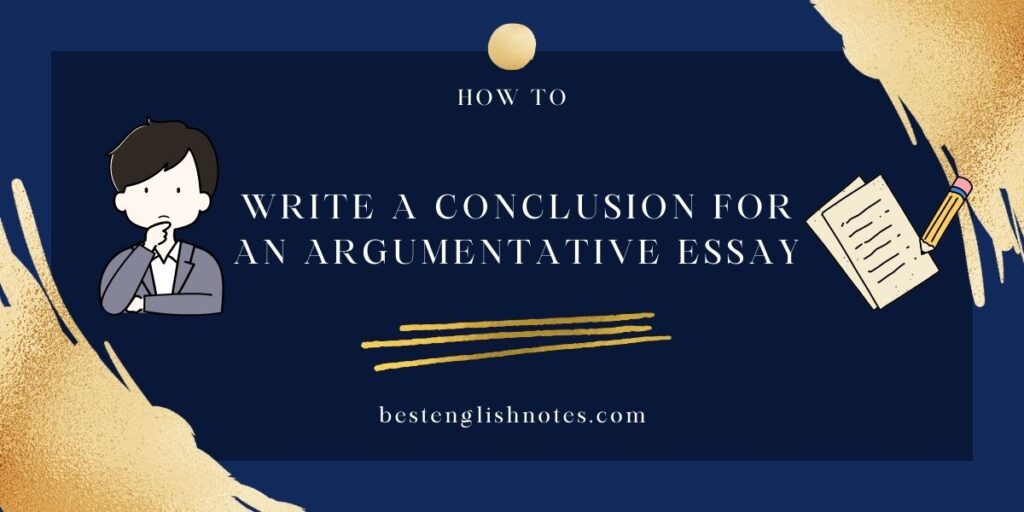How to Write a Conclusion for an Argumentative Essay
When it comes to writing an argumentative essay, the conclusion is your last chance to leave a lasting impression on the reader. Imagine a great speech or a powerful book without a strong ending. It will likely fall flat and fail to resonate. Similarly, an essay without a well-crafted conclusion can weaken the strength of your argument and leave your audience unconvinced.
In this blog post “How to Write a Conclusion for an Argumentative Essay”, we’ll explore the art of writing a compelling conclusion for an argumentative essay. We’ll explore why the conclusion is so important, what elements it should include, and practical techniques to ensure your closing paragraph leaves a strong impact. Whether you’re a student looking to improve your essay writing skills or a writer looking to perfect your craft, these tips will help you close your essays with confidence and effectiveness.
By the end of this post, you’ll have a clear understanding of how to restructure your thesis, summarize key points, and craft a powerful closing statement. We’ll also highlight common mistakes to avoid, provide examples of strong results, and offer tips for revising your work. Let’s start making your essay conclusions as effective as your arguments.

Understanding the Purpose of a Conclusion
The conclusion of an argumentative essay is very important because it wraps up your ideas and reinforces your main argument. Here’s why each part of the result is important:
Restate the thesis.
A thesis resume is important because it reminds your readers of the main point you’re trying to make. When you restate your thesis in the conclusion, it helps bring your argument full circle and shows that you’ve supported your main idea throughout the essay.
Summarize the key points.
Summarizing your main points is important because it helps your reader remember the strongest parts of your argument. However, it’s important to do this without repeating what you’ve already said. Instead, briefly highlight the main arguments in a new way, showing how they all tie together to support your thesis.
Emphasize importance.
Finally, emphasizing the importance of your argument shows why your essay matters. This section of the conclusion helps highlight the broader implications of your argument, showing readers why they should care about your topic. Whether it’s a call to action, a prediction, or a thought-provoking question, this conclusion section leaves your readers with something to ponder.
By understanding these key objectives, you can create a conclusion that effectively reinforces your argument and leaves a lasting impression on your readers.
A Robust Inference Technique
Writing a strong conclusion for your argumentative essay can make your argument more persuasive and leave a lasting impression on your readers. Here are some simple techniques to help you produce effective results:
Synthesize, don’t summarize.
Instead of summarizing your main points, try to synthesize them. This means combining your key arguments to show how they work together to support your thesis. This approach makes your conclusion more powerful and coherent.
Use a quote.
Adding a relevant quote to your conclusion can be a great way to reinforce your argument. Make sure the quote adds value and is directly related to your thesis. A well-chosen quote can leave your readers with something memorable to think about.
End with a provocative insight.
Leaving your readers with a thought-provoking thought or question can make your conclusion more impactful. It can be a surprising fact, a rhetorical question, or a call to action. The goal is to keep your readers thinking about your arguments long after they’ve finished reading.
Using these techniques, you can write a conclusion that not only wraps up your essay, but also strengthens your overall argument and engages your readers.
Examples of strong results.
To help you write a strong conclusion for your argumentative essay, here are some examples that demonstrate different types of effective closing statements:
Example 1: Restating the thesis and summarizing key points
“Finally, the evidence clearly shows that climate change is a significant threat to our planet. By reducing greenhouse gas emissions, investing in renewable energy, and promoting sustainable practices, we can reduce climate change. It is our responsibility to take immediate action to ensure a healthier, more sustainable world that we can mitigate the effects of change and protect our environment for future generations.”
Example 2: Call to action
“Ultimately, the need for stricter gun control laws cannot be ignored. By implementing comprehensive background checks, banning assault weapons, and enforcing stricter regulations, we can reduce gun violence. Save violence and lives. Now is the time for policymakers to listen to the voice of the majority and enact meaningful gun control legislation. Our safety and the safety of our communities depend on it.”
Example 3: Thinking question
“In short, the benefits of adopting a plant-based diet extend beyond personal health to include environmental sustainability and animal welfare. As we move forward, we must ask ourselves: How long can we continue to live our lives? Can the profound effects of dietary choices be ignored? The answer may be the key to a healthier planet and a more compassionate world.”
These examples show how to restructure your thesis, summarize key points, and add a strong closing statement, such as a call to action or a thought-provoking question. Use these techniques to create a conclusion that effectively reinforces your argument and leaves a lasting impression on your readers.
Points for revising the result
Once you’ve written your conclusion for your argumentative essay, it’s important to revise it to make sure it’s clear, compelling, and effective. Here are some simple tips for revising your results:
Read aloud
Reading your result aloud can help you identify any strange or unclear sentences. Pay attention to the flow of your words and edit as needed to improve clarity and coherence.
Ask for feedback.
Ask a friend, family member, or classmate to read your result and provide feedback. Fresh eyes can often catch mistakes or areas of improvement that you may have overlooked. Consider their suggestions and revise accordingly.
Revise for clarity and effect.
Make sure your conclusion is clear and to the point. Avoid unnecessary phrases or complicated language that could confuse your readers. Aim for simplicity and clarity to ensure your message is easy to understand and leaves a lasting impact.
By following these tips, you can revise your conclusion to ensure that it effectively reinforces your arguments and leaves a strong impression on your readers.
